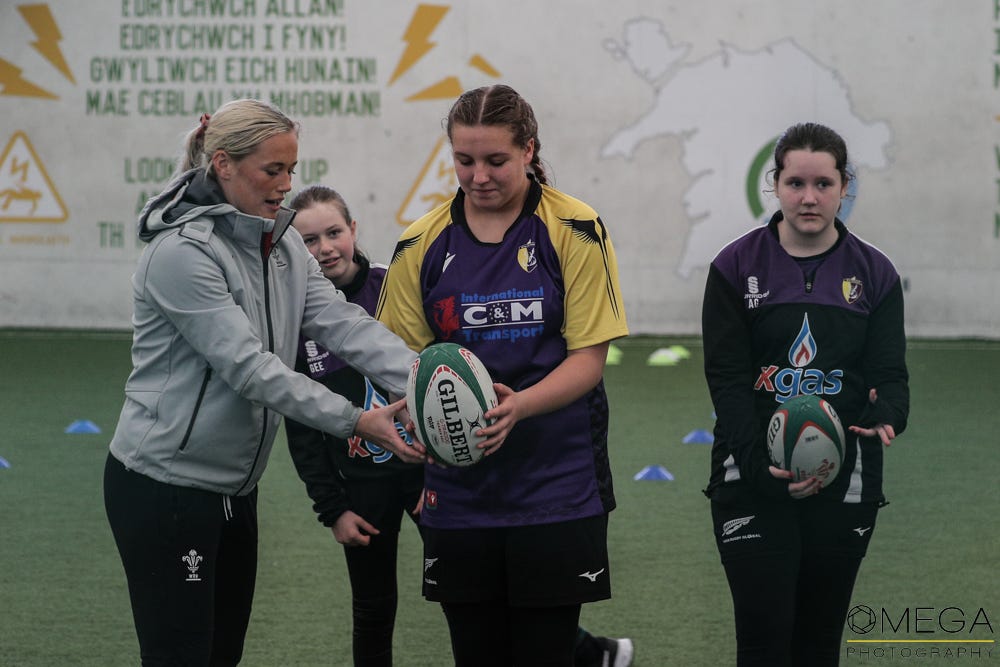How to coach rugby to people who've not played before
Empower players and make yourself a better coach in the process.
Sometimes I think we over complicate this sport. That probably makes rugby seem quite daunting to anyone new as well as potentially adding lots of unnecessary systems and processes to teams.
Coaching people that are new can help coaches, as much as it aids new players.
As a coach, helping players learn rugby can give you an appreciation of the power of this sport. You get to see players gain confidence in themselves and learn new skills.
It can also improve your craft. If you’re coaching rugby to someone who’s never played before you can’t rely on rugby jargon, your language has to be considered.
I believe coaching newbie players has made me a better coach. Here’s how I approach it from a philosophical perspective and what that looks like on the pitch.
Level up your game
I view the game in levels, especially when coaching the sport to newer players. This means I can add in aspects as the learning progresses. This means someone new to the sport doesn’t get overwhelmed with alot of information all at once.
It also simplifies it for me. I know there’s steps to follow that are informed by how the players are enjoying the sessions and the template of the sport.

I think of it like a puzzle. Each week, the players learn a bit more and they add another piece onto the puzzle. One puzzle piece might be offside at the ruck or the concept of the gainline and how to use it.
The biggest puzzle piece in the early days of their learning is passing backwards. Once this piece clicks into place, players gain huge amounts of confidence.
The most powerful tool is giving players space to share their experiences. Having a player who can speak about the backwards pass or any aspect of the game to another player is important.
It helps the newer player know they’re not alone in this experience. That the ‘click moment’ will come, and the puzzle piece will slot into place.
Mentioning that each session or aspect they’re learning fits into a wider picture helps players. It lets them know that each step in their learning journey is tailored to them and part of a guided plan.
This puzzle piece or levelled approach helps me contextualise what the players are learning and enables me to be creative with the session.
Taking an aspect of the game and being playful with it to help players explore is something I love.
By having a puzzle piece or levelling process, you have to acknowledge each step and where it sits within the sport.
This means you can’t completely isolate the puzzle piece, players need to be able to place it within the puzzle themselves.
Don’t remove a skill or aspect of the sport completely from the situation where players might encounter it within a match. It needs to replicate some sort of rugby.
Running at static cones on the ground as if they’re defenders probably isn’t going to help players build context.
However, creating a game that has mini rugby-like situations where players can work on something specific, helps add some understanding.
It doesn’t always have to fully be rugby, with complete rules, to replicate challenges and situations that help players learn.
For example:
This week at training, I wanted a warm up game that included a focus on playing the ball from the base of the ruck.
(I started with a game prior to this so that players started from an easier mental and physical level.)
We played multidirectional touch. Meaning that players can pass the ball in any direction. However, to add in the scrumhalf passing skill, players put the ball on the floor after the touch.
Another member of their team could pick up and play the ball. They could either run themselves or pass the ball.
Any member of the defending team could not come within 1 metre of the person, until the ball was picked up.
It got players working on passing the ball straight off the ground and looking to see whether their teammates were before they picked the ball up
There are several puzzle pieces within this game: running with the ball, passing a rugby ball, scoring on a tryline, looking for space, moving forward and invading space, closing down a team in defence.
The main puzzle piece I was focusing on was the scrumhalf pass but within a warm up game that recapped other aspects of the sport.
This particular element of the rugby was not removed from a games-based situtation with very little context for the players.
Players were involved in something that had mini rugby moments, within a game that acknowledged their wants and needs.
If you like Coaching Care Creativity and want to support the work, you can buy me a coffee by clicking the link:




As a new rugby player (who hopes to coach someday), I agree that doing drills that are too divorced from the game can be less helpful. Another frustrating part is overcomplicated drills where not only am I trying to remember the fundamental rugby steps in passing, tackling, etc, I’m also trying to remember all the different rules of a drill which makes it hard to focus on the rugby skills I’m trying to practice. I prefer simpler drills and if you want to have new(er) players work on thinking of multiple things at once, then try realistic game situations (like touch games) where the extra things are more applicable to rugby games (positioning, support, strategy, etc). It helps to have at least 1-2 veteran players to be vocal leaders to help direct newer players in game like situations as well (this helped me a lot in my first touch games).